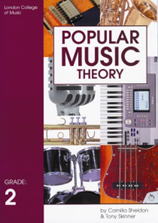Candidates are expected to have a good knowledge of the notes that make up scales - this is essential if the scales learnt in theory are to be used in a practical context.
All scales and key signatures are fully illustrated and explained in the grade handbooks - which also contain sample questions and answers. Find out more
Scales for Grade 2 Exam:
As Grade One plus:
Candidates are expected to have a good knowledge of chord symbols and the notes that make up chords - this is essential if the chords learnt in theory are to be used in a practical context.
All chords are fully illustrated and explained in the grade handbooks - which also contain sample questions and answers. Find out more
Chords for Grade 2 Exam:
As Grade One plus:
Candidates should have a practical understanding of time signatures, as well as note and rest values (including correct grouping).
Illustrations and explanations of all relevant aspects of rhythm notation are shown in the grade handbooks - which also contain sample questions and answers. Find out more
Rhythm Notation for Grade 2 Exam:
As for the previous grades plus:
Candidates will be asked questions in the following area:
Further information on all aspects of this section of the examination is given in the grade handbooks - which also contain sample questions and answers. Find out more
Knowledge of Popular Music for Grade 2 Exam:
Questions in this section largely focus on the candidate's ability to relate the knowledge of scales and chords, from Sections 1 and 2, to practical music-making situations - such as improvisation and composition of chord progressions.
Further information on all aspects of this section of the examination is given in the grade handbooks - which also contain sample questions and answers. Find out more
Harmony for Grade 2 Exam:
Practising with past exam papers can provide ideal preparation for your exam. Past papers also provide you with a clear example of the type and format of questions that may appear in the exam.
Click here to purchase Grade 2 Exam Papers.
The third book in the highly regarded 7 part series of Popular Music Theory handbooks, this book offers a perfect beginning in the earlier stages of popular music theory. This book will help you to improve your musicianship whether or not you intend to take the LCM examination.
All topics are for the exam are covered in a way that is directly applies to the music you play, making music theory both relevant and practical.
You’ll learn about keys, chords, scales, rhythms, harmony and improvisation as well as developing a broad musical knowledge (including instrumentation, musical terms and the history of popular music).
